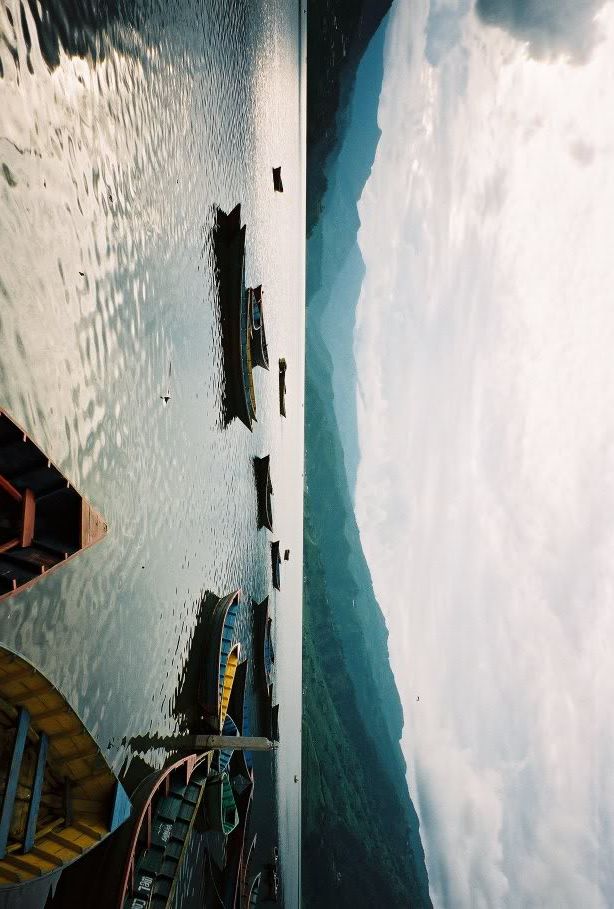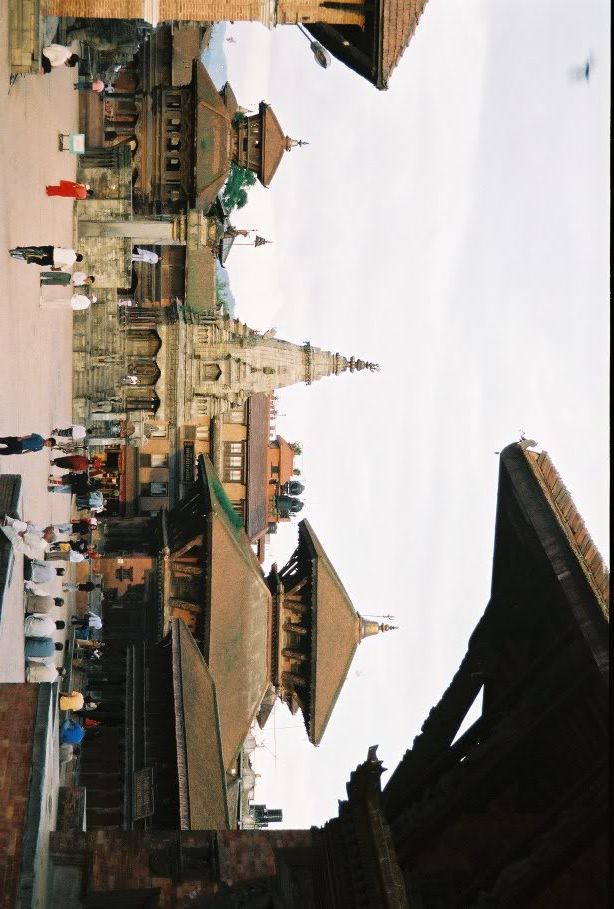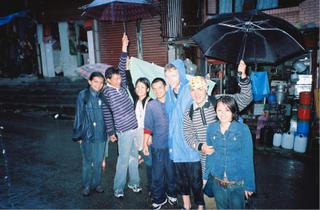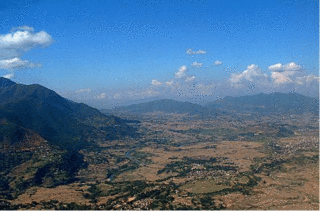
or was it really a silence?
as far as it matters to contacts with other people i guess it was (beside some practical matters such as ordering food); but many things happen inside silence, and some of them may be quiet noisy...
it's been ten and half days until this sunday, with meditation, studying, contemplating on the teachings, doing some prayers and ceremonies and taking the 8 mahayana precepts about every second day - that is not killing (sounds easy? - try to do it with all these hungry mosquitos around you), not stealing, not lying (here silence can be quite helpful), having no sexual activity, no intoxicants - alcohol, drugs and cigarettes, no singing and dancing, no luxorious beds, new jewels, and the highlight - one meal a day before midday.
a typical day started at about 04:00 (the ceremony of taking the precepts should be completed before sunrise, when it is still too dark to see the marks in the palm of your hand), and ends at 22:00-23:00, though usually i took a nap sometime in the middle. after cleaning the altar and changing the water in the waterbowl - which are being offered to the buddhas imagined as pure nectar, lighting the candle and the incense - a tibetan incense created especially for meditation, there was a session of morning meditation; then a yoga session, studying & reading, thinking & writing, and more meditation. actually the daily program was varied along the retreat.
there was the monastic atmosphere, with the monks and all their evening chantings; the morning and sometimes night ceremonies - decorated with sounds of bells, drums and horns; the recitations of prayers and religious texts - which are done either collectively in the temple or the classrooms, or individually while walking around in the grass or around the stupa; the philosophical debating, which constitutes an important part of the monastic studies and spiritual progress, and it is said that during the debates they expirience realizations of the emptiness of inherent existence, which is the true nature of reality. these debates are highly energetic, and are performed through dramatic hand claps whenever one has a punch line to make, in order to crush one's ego;

and there were also the occasional tantric ceremonies at the far side of the monestary, just behind my window, where the blessed ones who entered the holy gate of vajrayana, were singing mantras extatically with the background of what sounds like a didgeridoo, and it is also possible to sing the mantras through it, which creates a strange and beautiful sound effect. they were sitting around the small hangar, dressed with their maroon and orange robes and special hats which look like big cocks' heads (KARBOLOT) made out of metal. in the middle there is a fire, and two monks put oferrings on it, when all the others are ringing their bells in the right places.
all these things around you almost make you feel you are quiet normal to do all that you're doing...
i began my retreat with a day or two of emphasis on meditation on the breath - to stabilize my concentration. then i started to do some analytical meditations - ones that involve thought and analysis of certain topics - according to lama lhundrup's guidance: precious human life, suffering, impermanence, and death awareness. although i had some powerful expiriences with these meditations, i felt i needed a more specidic guidance in my retreat, and i searched the monastry's library and found myself a book with a teaching of exactly the topics i nedded, taught by the renowned lama zopa, who is lama lhundrup's guru. i went through the book slowly, reading a chapter or two per day, and then thinking and meditating on it. i also tryed to follow lama zopa's advice, and think that by reading the book i'm being guided by all the buddhas to happiness of future life, liberation, and enlightenment. Meditating like this makes you feel a closer connection to all the buddhas, and your mind causes you to recieve their blessings.
and indeed, the buddhas accepted my devotion with pleasure and granted me their blessings. i did my best to follow their path of renunciation, and began to taste the great bliss of cutting off my desires and letting go of the eight worldly concerns. walking around the monastery, i recited to myself this verse from nagarjuna's
"letter to a friend"
:
accquiring things, not acquiring things; comfort, discomfort;
interesting sounds, uninteresting sounds; praise, criticism:
these eight worldly cincerns are not an object of my mind.
they are all the same for me.
nevertheless, after some time i began to feel a bit restless. my meditational concentration was somewhat shaken, and from my expirience i knew that it is time to mute the buddhas for a while and listen to myself; that this restlessness must carry some information. it seemed like there was something in me that didn't like the idea of letting it all go.

the buddhas promised that cutting off desires doesn't mean actually letting go of things, and that you even enjoy more when there are no attachments. however, for this to happen you need no less then to give up this life in your mind; otherwise, it is no dharma.
- "and what about playing my guitar, what about the love of a woman? are these also worldly concerns, don't they have their aspect of spirituality?"
- "just a deep form of attachment!" the buddhas insisted.
the following days were filled with conflict. the battle was harsh and bloody, and i was rattling back and forth between devotion and resistance. it also appeared in my dreams (in one of them i introduced lama zopa to my mom). i tried to turn things around and around but by the end of the day the buddhas made their point again, clear and determined: "give up this life in your mind; give up this life in your mind; give up this life in your mind!"
well, i havn't...
my original retreat plan was to avoid the difficulties i have with buddhism and focus on meditations on the clear nature of the mind, with the hope that some realization of such nature would prepare the groung for confrontation with the issues of karma, rebirth, and the buddhist cosmology with the six realms of existence. it was lama lhundrup who directed just to these areas of conflict.
at the moment i feel that this retreat has made clear and solidified the gap between myself and tibetan buddhism, and made me understand that currently i don't want to become a buddhist. my trust in the teachings is not stong enough to have such a deep change in my life and my mind (the dalai lama said once that practicing buddhism is like performing construction works in your mind) based on the aspiration to complete enlightenment. however, i still have to deal with the challenge of finding a way to bring into my life all these things that i respect and appreciate so much in the teachings and in the practice, such as the power of compassion and meditation, and the weakening of the cravings to worldly things which is not complete nonesemse after all.
in the three days after my retreat i felt mostly a need to come back to life (which i did, and i already had some beautiful worldly adventures i will tell soon) and even some aversion to buddhism. i guess i need some time to come back to balance and see how i feel.
today i am leaving kopan for a few days around the kathmandu vally, and then dharmsala. tonight i am meeting ale, the spanish girl from kopan, for a dinner and a drink in kathmandu, and generally i'm about taking things easy.
i hope i didn't tire you with these stories. take care you all.


 שוב שלום. כשהיה מינוס 10 חשבתי לעצמי שאחרי כל האיומים החורף פה לא נורא כל כך. אפילו במינוס 15 יש משהו מרענן בלהתעטף בכל האביזרים ולשייט על האופניים. לא סיבה להסתגר בבית כמו שפחדתי. אבל בסוף השבוע האחרון למדתי שכשזה יורד מתחת למינוס 20 אז כן, זה כבר כן נורא. כל חלק עור שחשוף לאוויר פשוט כואאבבב.
שוב שלום. כשהיה מינוס 10 חשבתי לעצמי שאחרי כל האיומים החורף פה לא נורא כל כך. אפילו במינוס 15 יש משהו מרענן בלהתעטף בכל האביזרים ולשייט על האופניים. לא סיבה להסתגר בבית כמו שפחדתי. אבל בסוף השבוע האחרון למדתי שכשזה יורד מתחת למינוס 20 אז כן, זה כבר כן נורא. כל חלק עור שחשוף לאוויר פשוט כואאבבב.








































